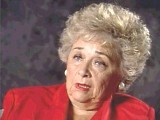You searched for: jewish
<< Previous | Displaying results 2421-2430 of 2504 for "jewish" | Next >>
-
Max Karl Liebmann describes arrival at and conditions in the Gurs camp
Oral HistoryBecause he was Jewish, Max could not join the army when World War II began. Instead, he had to perform labor service. In October 1940, Max and his mother were deported to the Gurs camp in France. In Gurs, Max met his future wife, Hanne. In 1941, with the help of the Children's Aid Society (Oeuvre de Secours aux Enfants; OSE), Hanne left the camp. Max followed in July 1942. He escaped to Switzerland through the French Alps and was in internment and refugee camps throughout the war. Hanne reached Switzerland…
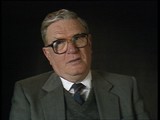
-
David Stoliar describes being the only witness to the fate of the "Struma"
Oral HistoryIn 1936, David moved to Bucharest to live with his father. As Romania came under German influence, Romanian authorities introduced increasingly harsh measures against Jews. Antisemitic agitation increased and Jews came under attack in the streets of Bucharest and in other public places. David's father decided David should leave the country and arranged passage for him to Palestine. In December 1941, David left Romania from Constanta, a port city on the Black Sea, on the "Struma," an old cattle boat. The…
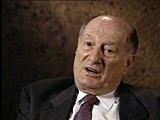
-
Helen (Helene Katz Wohlfarth) Waterford describes giving up her daughter to be sheltered
Oral HistoryAlthough originally from Germany, Helen was living in the Netherlands with her husband and young daughter when the Germans invaded in May 1940. Helen and her husband sent their daughter to non-Jewish friends, and went into hiding themselves. They stayed in a variety of places arranged by a friend who was active in the underground. On August 25, 1944, Helen and her husband were arrested. They were sent first to Westerbork and then to Auschwitz, where they were separated. Helen worked in the I. G. Farben…
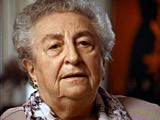
-
Norbert Wollheim describes a roundup of Jews in Berlin
Oral HistoryNorbert studied law and was a social worker in Berlin. He worked on the Kindertransport (Children's Transport) program, arranging to send Jewish children from Europe to Great Britain. His parents, who also lived in Berlin, were deported in December 1942. Norbert, his wife, and their child were deported to Auschwitz in March 1943. He was separated from his wife and child, and sent to the Buna works near Auschwitz III (Monowitz) for forced labor. Norbert survived the Auschwitz camp, and was liberated by US…
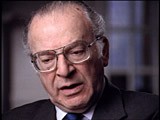
-
Henny Fletcher Aronsen describes living conditions in the Kovno ghetto
Oral HistoryHenny was born into an upper-middle-class Jewish family in Kovno, Lithuania. She and her brother attended private schools. In June 1940 the Soviets occupied Lithuania, but little seemed to change until the German invasion in June 1941. The Germans sealed off a ghetto in Kovno in August 1941. Henny and her family were forced to move into the ghetto. Henny married in the ghetto in November 1943; her dowry was a pound of sugar. She survived several roundups during which some of her friends and family were…
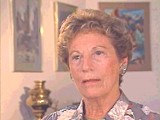
-
Chaim Engel describes arrival in Sobibor
Oral HistoryIn 1939, as Chaim's tour in the Polish army was nearing its scheduled end, Germany invaded Poland. The Germans captured Chaim and sent him to Germany for forced labor. As a Jewish prisoner of war, Chaim later was returned to Poland. Ultimately, he was deported to the Sobibor camp, where the rest of his family died. In the 1943 Sobibor uprising, Chaim killed a guard. He escaped with his girlfriend, Selma, whom he later married. A farmer hid them until liberation by Soviet forces in June 1944.
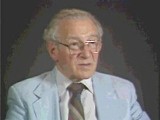
-
Charlene Schiff describes her liberation by Soviet troops
Oral HistoryBoth of Charlene's parents were local Jewish community leaders, and the family was active in community life. Charlene's father was a professor of philosophy at the State University of Lvov. World War II began with the German invasion of Poland on September 1, 1939. Charlene's town was in the part of eastern Poland occupied by the Soviet Union under the German-Soviet Pact of August 1939. Under the Soviet occupation, the family remained in its home and Charlene's father continued to teach. The Germans…
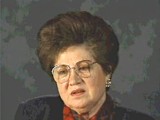
-
Norbert I. Swislocki describes leaving Warsaw with his mother upon the outbreak of war
Oral HistoryNorbert was 3 years old when Germany invaded Poland in September 1939. He and his mother were in Warsaw; his father had been drafted into the Polish army and later ended up in Vilna. Norbert and his mother set out to join him and the family was reunited after a few months. After the family had been in Vilna for about a year, Norbert's father was able to obtain visas for Curacao in the Dutch West Indies and visas for transit through Japan. Norbert and his parents left Vilna in January 1941, and arrived in…
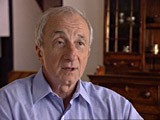
-
Herbert A. Friedman describes finding two child survivors after liberation
Oral HistoryHerbert graduated from Yale in 1938. He became a rabbi and worked very closely with American Jewish leader Stephen S. Wise. He became a chaplain in the US Army during World War II. In the spring of 1945, he went to Europe. When the war ended, he was recruited by David Ben-Gurion into the Aliyah Bet ("illegal" immigration) operation of the Hagana. This involved smuggling Jews from eastern Europe through Germany to Palestine. He worked with displaced persons, mainly in Berlin and the American zone of…
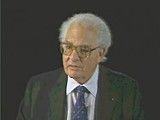
-
Lucine Horn describes obtaining false papers to assume the identity of an "Aryan" outside the Warsaw ghetto
Oral HistoryLucine was born to a Jewish family in Lublin. Her father was a court interpreter and her mother was a dentist. War began with the German invasion of Poland on September 1, 1939. Lucine's home was raided by German forces shortly thereafter. Soon after the German occupation of Lublin, Jews there were forced to wear a compulsory badge identifying them as Jews. A ghetto in Lublin was closed off in January 1942. Lucine survived a series of killing campaigns and deportations from the ghetto during March and…
